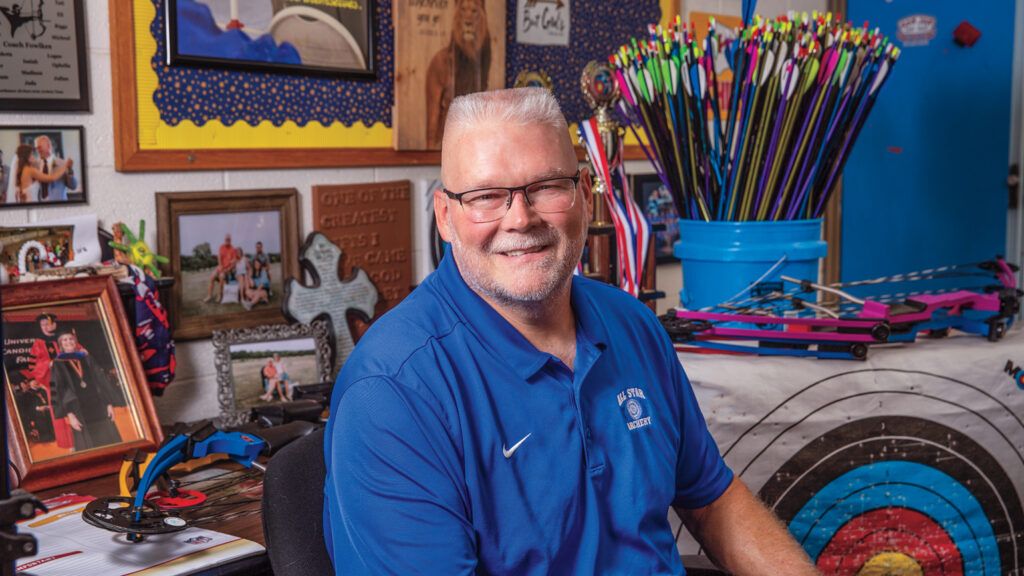The first day back in the school gym after summer break had always felt so right. I looked around at the familiar pennants hanging above the bleachers, the hoops at either end of the court, our archery equipment—kind of a home away from home for me.
I believed that God had designed me to do this work. That I could bring something to these kids that no one else could, that the school gym was where I was meant to be. But as the sixth graders filed in wearing their masks, I felt uneasy. None of the old greetings with high-fives or pats on the shoulder for jobs well done. Social distancing wasn’t going to help me feel connected to the kids in the way I was used to.
Covid-19 had sent us home to close out last year remotely before we took our summer break. My confidence as a teacher had taken a hit, and I was trying to get back on my game. I hoped the kids couldn’t tell.
“Let’s take our places!” I called out, making sure to speak clearly through my mask. “Six feet apart, everybody. Keep six feet apart.” I sounded like a drill sergeant.
Awkward couldn’t begin to describe how I’d felt when all this first started. I was in no way tech-savvy, which had never been a problem in my 23 years as a gym teacher. I had to learn on the fly how to make fitness videos, post them on the school site and send them out via email. Plus, I had to come up with the content for two videos a week that were appropriate for different age groups.
My wife, Carol, was a teacher too, and more of a computer person. Whenever I got discouraged, she reminded me that there was nothing either of us had to do alone. We were still in college when she was diagnosed with Type 1 diabetes, a very scary time in our young lives. “If we could get through that as a team, we can get through anything,” she said.
Carol filmed me running up and down stairs for cardio, and pitching socks into a laundry basket for aim. I tried to infuse each video with personality, hoping to be as present as possible for my students. Now that we were finally in the same room again, it still wasn’t the same.
“Okay, guys,” I called out, “let’s do our warm-up.” These sixth graders knew my routine, at least. I felt a little more comfortable knowing we had a history. Many of them had been my students since first grade. And then I noticed a kid I’d taught since second grade.
“Wow, buddy,” I said, walking his way. “Looks like you lost some weight?”
Owen looked down at himself and shrugged. “I played some baseball over the summer,” he said. Owen was a member of my after-school archery team, an athletic kid, but I wondered how much baseball he’d have to have played in the heat to turn him into skin and bones. Otherwise he seemed like the boy I knew, and he said everything was fine.
We spent the first week of lessons on outdoor soccer. We traveled through circuit training stations doing push-ups and sit-ups. I got used to the new protocols, but they were a constant reminder of a disconnect. “God made you a teacher for a reason,” Carol reminded me that weekend. “When you believe that again, all your confidence will come back. You’ll see.”
Monday morning, I stood in front of three wide rows of sixth graders sitting cross-legged on the hardwood floor. We’d played a rousing game of soccer, but they were still bursting with energy. All except Owen, whose eyes were closed. His chin touched his chest. He’d nodded off, right here in gym class. Something wasn’t right.
“Owen, why are you so tired?” I asked after class.
“I don’t know. I just am.”
“I’m concerned about Owen,” I told his core teacher. “Keep an eye on him in class. Let me know if he falls asleep again.”
Not two minutes into my next class, I got a text: “Owen’s putting his head down on his desk. He says he’s very tired.”
Owen’s weight loss and fatigue—I’d seen it before. I hadn’t recognized the symptoms when Carol had them in college, but I did now. I asked another teacher to watch my class, slipped into my office and called Owen’s mother. “Have you noticed Owen being thirstier than usual?” I asked. “Visiting the bathroom more often?”
“Maybe,” she said. “He’s scheduled for a checkup in a couple of weeks.”
“He should see a doctor today,” I told her. “If his primary care physician can’t see him, please take him to a walk-in clinic. He may have juvenile diabetes.”
Owen’s mom picked him up right away. My mind—and my prayers—stayed with him. I was getting ready to leave for the day when Owen’s mom called with an update: Owen had been admitted to the hospital with a blood sugar level 10 times greater than normal. “The doctor said if I’d waited even a day or two to bring him in, Owen would have gone into diabetic ketoacidosis,” she told me. I knew that could lead to a coma or even death.
Carol was stunned when I told her about it at home. “You know better than anybody how hard it can be to see the signs of diabetes,” she said. “I guess it’s clear you brought something special to those kids today.”
I returned to school the next day with my old confidence, knowing that I was right where I belonged, right where God wanted me to be. Especially after I talked to Owen’s mother again. It turns out the family had moved over the summer. Owen should have transferred to another district, one where no teacher would have noticed the change in him. His mother had gotten special permission for him to spend his last year at our school so he could stay connected to his old friends and teachers.
Something God knew all about.
For more angelic stories, subscribe to Angels on Earth magazine.






